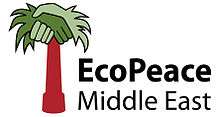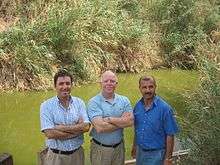Friends of the Earth Middle East
 | |
| Founded | 1994 |
|---|---|
| Location | |
Key people | Munqeth Mehyar (Chairperson and Jordanian Director) , Gidon Bromberg (Israeli Director), Nader Al-Khateeb (Palestinian Director) |
Employees | 40 |
| Website | http://foeme.org |
Formerly called | Friends of the Earth Middle East (FoEME) |

EcoPeace Middle East (formerly known as Friends of the Earth Middle East/FoEME) is an organization active in environmental peacemaking in the Middle East.
Group focus and efforts
As a tri-lateral organization that brings together Jordanian, Palestinian and Israeli environmentalists, its primary objective is the promotion of cooperative efforts to protect a shared environmental heritage. In so doing, it seeks to advance both sustainable regional development and the creation of necessary conditions for lasting peace in the region. EcoPeace has offices in Amman, Bethlehem, and Tel-Aviv, employs 40 paid staff and actively involves hundreds of volunteers.
The people and wildlife of the region are dependent on many of the same natural resources. Shared surface and sub-surface freshwater basins, shared seas, common flora and fauna species and a shared air-shed are some of the characteristics that necessitate regional cooperation. EcoPeace's efforts are thus focused on the rehabilitation of the Jordan River, Dead Sea, Mountain and Coastal Aquifers and fostering awareness about the regional impact of climate change. EcoPeace advances these projects by publishing scientific and social research, spearheading national-level advocacy campaigns and engaging in grassroots community development. EcoPeace's focal program, the Good Water Neighbors project, engages residents of all ages, mayors and municipal representatives in twenty five communities throughout Israel, Palestine and Jordan in a united effort to rehabilitate the regions' shared water resources.
Awards
EcoPeace's three co-directors -- Gidon Bromberg (Israel), Munqeth Mehyar (Jordan) and Nader Al-Khateeb (Palestine) -- were honored by Time magazine as Environmental Heroes of 2008[1] and the organization was granted the prestigious Skoll Award in 2009.[2] EcoPeace also received a 2008 SEED Finalist Award. In 2010, EcoPeace's Good Water Neighbors project was awarded the Green Globe Award for the best Environmental Education project. In the same year, EcoPeace was the first organization chosen as the winner of the Onassis Prize for the Protection of the Environment.[3] In 2011, the International Development Committee (IDC) of the Association for Conflict Resolution (ACR) honored EcoPeace with the Outstanding Leadership Award for its outstanding work. Also in 2011, EcoPeace received the Mount Zion Award for having significantly contributed to the understanding of the three Abrahamic religions, Judaism, Christianity and Islam, in Israel.
Group issues and actions
One of EcoPeace's major efforts is a regional advocacy project to promote discussion and sharing of water resources.[4]
EcoPeace has taken a leading role in calling for action to save the Dead Sea, which may be in danger of drying up due to some environmental factors.[5] Various groups and government officials from several countries say that a pipeline from the Red Sea is needed to save the Dead Sea.[5] In June 2009, after a meeting with World Bank President Robert Zoellick, the Israeli Regional Cooperation Minister, Silvan Shalom, announced a pilot project to build a "pilot" pipe 180 km long from the Red Sea to the Dead Sea. The pipe would pump 200 million cubic meters per year. Half of this would be desalinated for Jordanian consumption and half put into the Dead Sea.[6] Some experts questioned this project. Hebrew University of Jerusalem Prof. Avner Adin said more studies were needed on the potential environmental impact.[7][8]
Reports
- Environmental Peacebuilding Theory and Practice
- Identifying Common Environmental Problems and Shared Solutions
- Good Water Neighbors
- Municipal Cooperation across Conflict Divides - A Preliminary Study
- Nature, Agriculture and the Price of Water in Israel
- Economic Valuation of Resuscitating the Dead Sea
- Advancing Conservation and Sustainable Development of the Dead Sea Basin - Broadening the Debate on Economic and Management Issues
- Let the Dead Sea Live
- Dead Sea Challenges
- One Basin - One Strategy
- Jordan River Peace Park Pre Feasibility Study
- How Past Trans-boundary Security Arrangements Can Change the Future of Peace Parks in the Tri-partite Region
- EcoPeace Report on the Proposed Red Dead Conduit
- Red Sea-Dead Sea Conduit - Geo-Environmental Study Along the Arava Valley
- A Seeping Time Bomb: Pollution of the Mountain Aquifer by Solid Waste
For more, see Publications tab on EcoPeace website
Video
EcoPeace Eco-Park in the Zeiglab Basin, Jordan Valley
Good Water Neighbors and youth - "Green Mideast Peace"
Gidon Bromberg on the Jordan River Peace Park
Gidon Bromberg - Peace through environmental activism
Gidon Bromberg on the Good Water Neighbors Project
External links
References
- ↑ Butters, Andrew Lee. "Activists: Gidon Bromberg, Nader Al-Khateeb And Munqeth Mehyar." TIME Magazine - Heroes of the Environment 2008. http://www.time.com/time/specials/packages/article/0,28804,1841778_1841781_1841807,00.html
- ↑ "Skoll Foundation Adds Seven Organizations to its Portfolio of Leading Social Entrepreneurs - $5.35 Million in Unrestricted Grants Will Provide Flexibility in Challenging Economic Environment." Press Release: 12 March 2009. http://www.skollfoundation.org/media/press_releases/internal/031209.asp
- ↑ The Aristotle Onassis International Prize for the Protection of the Environment 2010 is awarded to "Friends of the Earth Middle East", November 03, 2010, 1888 Press Release.
- ↑ Jordanians, Palestinians and Israelis gather for a regional advocacy meeting, February 2011, EcoPeace website.
- 1 2 Dead Sea needs world help to stay alive by Ahmad Khatib, Agence france presse, 11/25/09.
- ↑ Jpost article on Silvan Shalom announcement, jpost.com, 6/28/09.
- ↑ Water expert: Red-Dead 'pilot' project could be premature, By EHUD ZION WALDOKS, Jun 28, 2009.
- ↑ Jerusalem Post editorial, June 28, 2009
